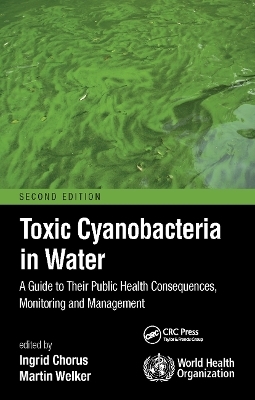
Toxic Cyanobacteria in Water
CRC Press (Verlag)
978-0-367-53332-8 (ISBN)
Cyanobacterial toxins are among the hazardous substances most widely found in water. They occur naturally, but concentrations hazardous to human health are usually due to human activity. Therefore, to protect human health, managing lakes, reservoirs and rivers to prevent cyanobacterial blooms is critical.
This second edition of Toxic Cyanobacteria in Water presents the current state of knowledge on the occurrence of cyanobacteria and cyanotoxins as well as their impacts on health through water-related exposure pathways, chiefly drinking-water and recreational activity. It provides scientific and technical background information to support hazard identification, assessment and prioritisation of the risks posed by cyanotoxins, and it outlines approaches for their management at each step of the water-use system. It sets out key practical considerations for developing management strategies, implementing efficient measures and designing monitoring programmes. This enables stakeholders to evaluate whether there is a health risk from toxic cyanobacteria and to mitigate it with appropriate measures.
This book is intended for those working on toxic cyanobacteria with a specific focus on public health protection. It intends to empower professionals from different disciplines to communicate and cooperate for sustainable management of toxic cyanobacteria, including public health workers, ecologists, academics, and catchment and waterbody managers.
Ingrid Chorus headed the department for Drinking-Water and Swimming-Pool Hygiene at the German Environment Agency.
Martin Welker is a limnologist and microbiologist, currently with bioMérieux in Lyon, France.
Martin Welker started his career as a plankton ecologist at the Institute of Freshwater Ecology, Berlin. His PhD thesis focused on cyanobacteria and their toxins, with a particular emphasis on the release and degradation of microcystins by biotic and abiotic processes. As a post-doc at the Technical University of Berlin and Institute Pasteur, Paris, he explored the diversity of cyanobacterial metabolites and their biosynthesis. In 2006, Martin joined AnagnosTec, contributing to the development of microbial identification systems for clinical diagnostics. In 2010, Martin joined bioMérieux as senior scientist where he works on clinical microbiological diagnostics and research. Ingrid Chorus completed her PhD at the Technical University, Berlin, supporting a collaborative ecosystem study of a highly eutrophic urban lake, and in the 1980’s, she studied the restoration of lakes to from heavy eutrophication. In 1991, Ingrid became head of the German Federal Environment Agency’s unit on drinking-water resources and began her focus on cyanotoxin research and management. From 2007 until 2018, she led the agency’s Department for Drinking-Water and Swimming-Pool Hygiene. A key focus of her work was developing and implementing the WHO Water Safety Plan approach, particularly towards catchment and waterbody management.
1 Introduction 2 Cyanobacterial toxins 3 Introduction to cyanobacteria 4 Understanding the occurrence of cyanobacteria and cyanotoxins 5 Exposure to cyanotoxins: Understanding it and short-term interventions to prevent it 6 Assessing and managing cyanobacterial risks in water-use systems 7 Assessing and controlling the risk of cyanobacterial blooms: Nutrient loads from the catchment 8 Assessing and controlling the risk of cyanobacterial blooms: Waterbody conditions 9 Managing cyanotoxin risks at the drinking-water offtake 10 Controlling cyanotoxin occurrence: Drinking-water treatment 11 Planning monitoring programmes for cyanobacteria and cyanotoxins 12 Fieldwork: Site inspection and sampling 13 Laboratory analyses of cyanobacteria and water chemistry 14 Laboratory analysis of cyanobacterial toxins and bioassays 15 Public health surveillance, public communication and participation
| Erscheinungsdatum | 09.09.2022 |
|---|---|
| Zusatzinfo | 59 Tables, black and white; 64 Line drawings, black and white; 37 Halftones, black and white; 101 Illustrations, black and white |
| Verlagsort | London |
| Sprache | englisch |
| Maße | 156 x 234 mm |
| Gewicht | 1280 g |
| Themenwelt | Naturwissenschaften ► Geowissenschaften ► Geologie |
| Naturwissenschaften ► Geowissenschaften ► Hydrologie / Ozeanografie | |
| Technik ► Bauwesen | |
| Technik ► Umwelttechnik / Biotechnologie | |
| ISBN-10 | 0-367-53332-4 / 0367533324 |
| ISBN-13 | 978-0-367-53332-8 / 9780367533328 |
| Zustand | Neuware |
| Informationen gemäß Produktsicherheitsverordnung (GPSR) | |
| Haben Sie eine Frage zum Produkt? |
aus dem Bereich


